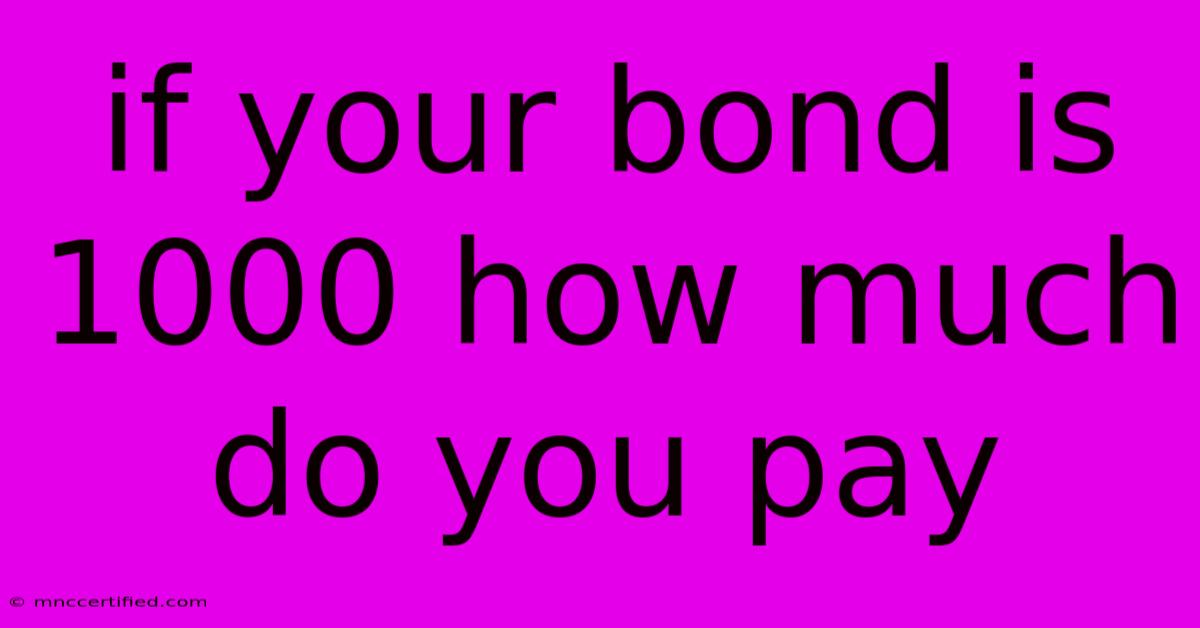If Your Bond Is 1000 How Much Do You Pay

Table of Contents
Understanding Bond Payments: A Clear Guide to Your 1000 Bond
If you're looking to rent a property, you've probably come across the term "bond." But what exactly is it, and how much can you expect to pay for a $1000 bond? In this guide, we'll break down everything you need to know about bonds, including:
- What is a bond?
- Why is a bond required?
- How much is a bond for a $1000 rental?
- Factors influencing bond amount
- Tips for getting your bond back
What is a Bond?
A bond, also known as a security deposit, is a financial guarantee paid by a tenant to a landlord. It's held in a trust account and is intended to cover any potential damages to the property or unpaid rent.
Why is a Bond Required?
Landlords require bonds to protect themselves from financial losses caused by:
- Damage to the property: This includes wear and tear beyond normal use, accidental damage, or intentional vandalism.
- Unpaid rent: If a tenant fails to pay rent on time or at all, the bond can be used to cover the outstanding amount.
- Breach of lease agreement: Violating the terms of the lease, such as subletting without permission or keeping a pet without authorization, can lead to bond deductions.
How Much is a Bond for a $1000 Rental?
There's no set rule for how much a bond should be for a $1000 rental. The amount typically depends on:
- Local regulations: Different states and territories have their own laws regarding maximum bond amounts.
- Landlord's policy: Individual landlords may set their own bond requirements based on factors like property type and location.
- Lease agreement: The lease agreement will clearly outline the bond amount.
Generally, bonds are often equivalent to one or two weeks' rent, but it's always best to refer to your lease agreement for the specific amount.
Factors Influencing Bond Amount
Here are some factors that can influence the bond amount:
- Property type: Larger or more luxurious properties may have higher bond requirements.
- Location: Bonds in metropolitan areas or high-demand locations might be higher.
- Number of tenants: A higher number of tenants can sometimes lead to a larger bond amount.
- History of damage: Landlords may increase the bond for tenants with a history of causing property damage.
Tips for Getting Your Bond Back
Here are some tips to ensure you get your bond back in full:
- Read the lease agreement: Thoroughly understand the terms and conditions related to bond deductions.
- Document everything: Keep records of any repairs or improvements you've made to the property.
- Take photos before moving in: Document the condition of the property before you move in to avoid any disputes about pre-existing damage.
- Clean thoroughly when you move out: Ensure the property is left in a clean and tidy condition according to the lease agreement.
- Communicate with your landlord: If there are any issues, address them promptly with your landlord.
- Follow the bond return process: Ensure you complete any required paperwork and contact the landlord within the specified timeframe.
Conclusion
Understanding bond payments is crucial for both tenants and landlords. By knowing your rights and responsibilities, you can avoid potential conflicts and ensure a smooth renting experience. Always review your lease agreement carefully and communicate clearly with your landlord to ensure you get your bond back in full.

Thank you for visiting our website wich cover about If Your Bond Is 1000 How Much Do You Pay. We hope the information provided has been useful to you. Feel free to contact us if you have any questions or need further assistance. See you next time and dont miss to bookmark.
Featured Posts
-
Walz Returns Home Following Election Loss
Nov 07, 2024
-
Whats Next For Gov Walz In 2024
Nov 07, 2024
-
Trump Inauguration Date And Key Details
Nov 07, 2024
-
Is It Cheaper To Insure A New Or Used Car
Nov 07, 2024
-
Knight Specialty Insurance Company Am Best
Nov 07, 2024